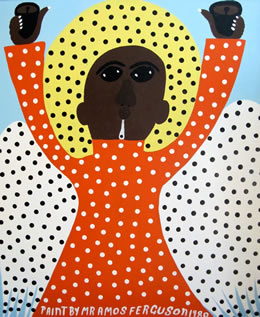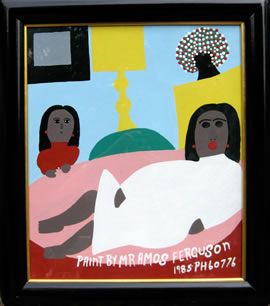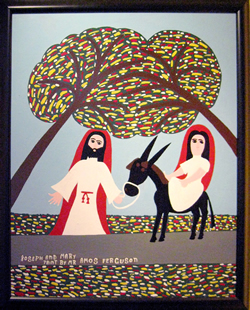For Sunday December 6, 2015
Second Sunday in Advent
Lectionary Readings (Revised Common Lectionary, Year B)
Malachi 3:1–4 or Baruch 5:1–9
Luke 1:68–79
Philippians 1:3–11
Luke 3:1–6
A guest essay by Sara Miles. Sara Miles is the author of Take This Bread: A Radical Conversion, Jesus Freak: Feeding Healing Raising the Dead, and City of God. She is the Director of Ministry at St. Gregory of Nyssa Episcopal Church in San Francisco.
Baruch 5:1-9
Take off the garment of your sorrow and affliction, O Jerusalem,
and put on forever the beauty of the glory from God.
Put on the robe of the righteousness that comes from God;
put on your head the diadem of the glory of the Everlasting;
for God will show your splendor everywhere under heaven.
For God will give you evermore the name,
"Righteous Peace, Godly Glory."
Arise, O Jerusalem, stand upon the height;
look toward the east,
and see your children gathered from west and east
at the word of the Holy One,
rejoicing that God has remembered them.
For they went out from you on foot,
led away by their enemies;
but God will bring them back to you,
carried in glory, as on a royal throne.
For God has ordered that every high mountain and the everlasting hills be made low
and the valleys filled up, to make level ground,
so that Israel may walk safely in the glory of God.
The woods and every fragrant tree
have shaded Israel at God's command.
For God will lead Israel with joy,
in the light of his glory,
with the mercy and righteousness that come from him.
 |
|
Angel.
|
Luke 3:1-6
In the fifteenth year of the reign of Emperor Tiberius, when Pontius Pilate was governor of Judea, and Herod was ruler of Galilee, and his brother Philip ruler of the region of Ituraea and Trachonitis, and Lysanias ruler of Abilene, during the high priesthood of Annas and Caiaphas, the word of God came to John son of Zechariah in the wilderness. He went into all the region around the Jordan, proclaiming a baptism of repentance for the forgiveness of sins, as it is written in the book of the words of the prophet Isaiah,"The voice of one crying out in the wilderness:
'Prepare the way of the Lord,
make his paths straight.
Every valley shall be filled,
and every mountain and hill shall be made low,
and the crooked shall be made straight,
and the rough ways made smooth;
and all flesh shall see the salvation of God.'"
Once in a while, if you’re lucky, after hearing the same phrase over and over and over, for some reason it can suddenly break in to your consciousness, in a new way, and everything you’ve understood previously just crashes and changes. My mother loves to tell the story of me sitting in a high chair when I was about three years old and free-associating about all the colors of my breakfast, since I’d just learned the names of some colors. I was saying blue…my plate is blue; green…that sock is green; orange, orange…my juice is orange…and then I stopped, totally transfixed, and said orange. Orange juice. It’s ORANGE JUICE!!!.
This reading from Baruch is like that for me: we hear part of this prophecy at my church almost every Sunday, as our post-communion prayer, and it’s often like… orange juice. But in Advent, the season of apocalypse — of revelation — it feels worth listening to anew.
Of course, any verses of Scripture that feature tiaras — the diadem of the Eternal One’s glory — should grab our attention. But with or without sparkles, the beautiful thing about this passage is its assurance that God remembers us. God will flatten the high mountains and fill in the valleys, will turn the whole world upside down — and not just to be contrary. God remembers us, and will do whatever it takes, even re-making the everlasting hills, to bring us home alongside God’s other children, restored to the One who made us. God longs for all people to walk in safety, to be shaded by fragrant trees, to be guided by mercy and saving justice, to arise and shine and live wrapped in the love of the one who has accompanied us through our wanderings and pain. Arise, Jerusalem, and look about: God has remembered us.
And because it’s Advent, I pray to also hear, in a new way, the words of the prophet Isaiah quoted in the Gospel reading. The writer of Luke had probably heard Isaiah a zillion times, but in that surprising moment of revelation, the revelation of Christ Jesus, he heard the words anew: Prepare a way for the Lord, make his paths straight! Let every valley be filled in, every mountain and hill leveled, winding ways straightened and rough roads made smooth, and all people will see the salvation of God.
 |
|
A Lady Expecting.
|
Luke’s telling of Isaiah’s telling sounds new to me if I hear it not only as about John in the desert, but about Jesus’ mother, who lived in a different kind of wilderness as an unmarried, pregnant girl, and who makes a way for the Lord, preparing a path straight through her own human body.
And Baruch’s words sound new to me, too, when I hear them echoed in the Prophet Mary’s proclamation that the lowly and hungry, like the valleys, will be raised up and filled with good things, and the rich and proud, like the mighty mountains, will fall and be leveled.
Every old, familiar story can be heard anew in Advent as we wait for Jesus, who comes to fulfill God’s desire that all people, from the rising to the setting sun, may see salvation.
This isn’t a matter of rewriting history, or claiming that people who lived centuries before Jesus were speaking about him, or going back in time as if we can explain better, from our modern vantage point, what the prophets really meant. There are endless depths of meaning in Scripture: the challenge is to remain open to surprise as we draw from the well of tradition, so we can see the new thing God is doing right now. And so we can act on it.
The words of Luke, of Isaiah, and of Baruch were all written down at particular moments of history, in specific places. And in every time and place they’re proclaimed, whether in the 6th or 8th century before Christ in Judah, or in the first century around Jerusalem, or in the twenty-first century in any American city, these words can always reveal new understandings, new ways of seeing and acting, for the people who hear them. Because the good news, across the ages, is that God — who accompanies us in history, in every moment of our real lives — God remembers us.
Luke takes pains to point out that the Word of God came to John in the time of Tiberius Caesar and Pontius Pilate and Herod. These were the rulers of the world who thought that they, not God, were in charge, and Luke locates the revelation John received as taking place smack in the middle of that difficult political context: just as he will locate the annunciation to Mary and Jesus’ birth in other specific political contexts.
And so why should we be surprised that God has not forgotten us in the time of Donald Trump, or Bashir Assad, or Microsoft-Disney-CNN-Fox-Walmart, or any other rulers who think they are in charge? The God who promised to remember his people throughout history is not blocked by the schemes of human rulers. And though the prophet mentions that God likes to strew tiaras around, given the opportunity, God also remembers her people when everything is unadorned: in the desert, in the ruins of the temple, in the saddest and most violent cities, in the tackiest lonely shopping malls, in the womb of an unprepared mother.
And so, even if we think we’ve heard it a zillion times before, the Word of God has the power to break into our consciousness in surprising ways. We just have to pay attention. God calls to us through history, through all the old stories, and through the darkness of this very Advent, yearning for us, and asking us to act to make a path for his coming.
 |
|
Joseph and Mary.
|
You can make a path for the Lord in all kinds of times and places. Try it. Try actually listening to the same old words when you repeat “Lord have mercy” — and then practice mercy, with your enemies, with those who wrong you and those you’ve wronged. Try walking along the same route you take every day, with a friend in a wheelchair, or with a toddler, and see if you notice new rough places — and then practice smoothing the way for others. Try listening to the angry ranting man on the street corner once in a while, instead of the cops who come to shoo him along — and if you notice something new about justice, act on it.
Or try looking, as I did last week, at apples. I picked buckets from my back yard, as I do every year, and there were so many left over, even after making applesauce and apple butter and apple pies, that it suddenly occurred to me, like a completely new thought, “It’s as if they just grew on trees!” Orange JUICE! It’s as if God, who made the world, feeds the world for free. Huh. Maybe I should try that, too…so I took bags of apples to the neighbors, and then to strangers in the park.
Because seeing with new eyes, realizing how God has broken into our tired and familiar history once again, gives us once again the chance to repent. That is, to turn toward the God who remembers us, and live out peace-through-justice like Baruch; to offer our bodies to be used to magnify the Lord like Mary; to act, as Isaiah says, so that the way will be prepared for all people — all people — to see salvation.
With every action, every thing we do, we are preparing a way for the Lord — the way connecting us with God’s surprising truth and enduring promise; the way bringing us home. We can put stumbling blocks on the way, scatter landmines on it, or sweep the way carefully, to reveal it. And always, we can grab other people by the hand and say, hey, listen to this:
“Arise, Jerusalem, and stand on high, and look about you to the east, and behold your children gathered from the rising to the setting sun at the word of the holy one, rejoicing that God has remembered us."
Image credits: (1–3) Amos Ferguson.



